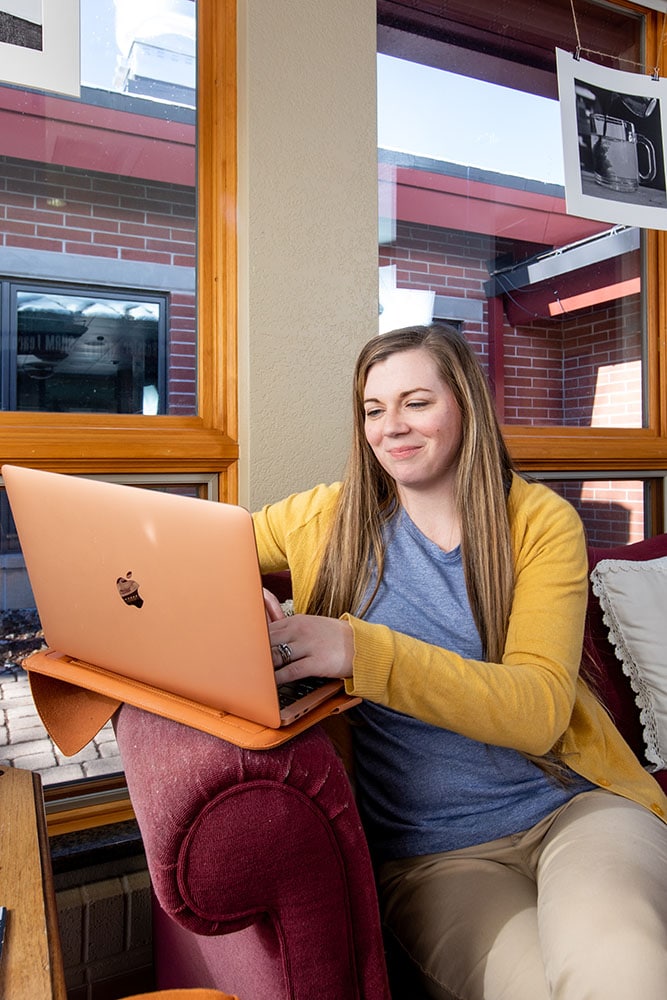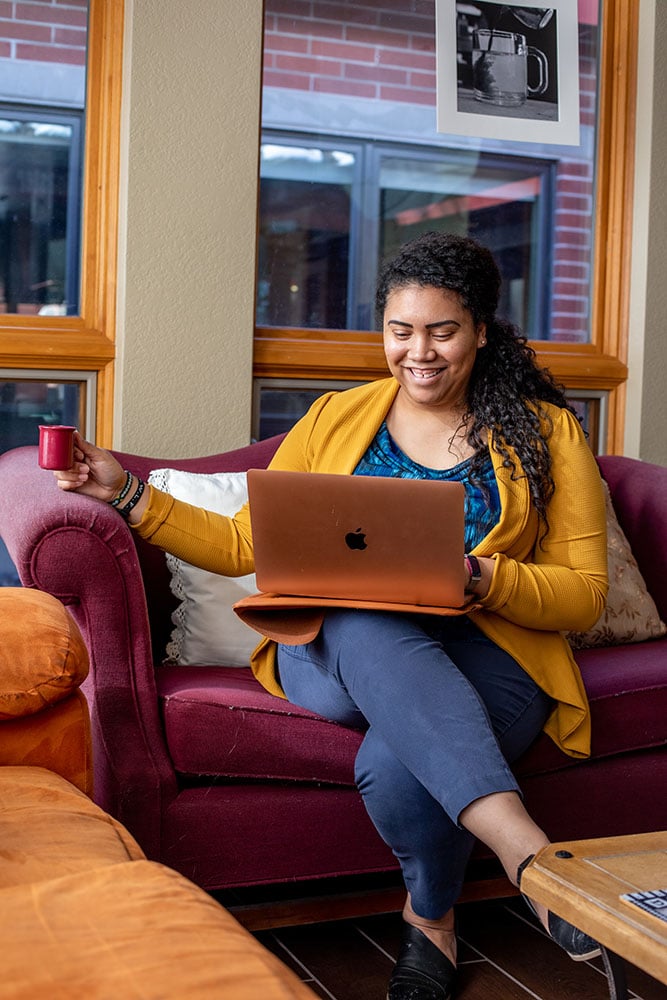by Amber Connolly and Jamie Totland, NAU Jacks Online Senior Mentors
As NAU transitions from in-person classes to an online format, it may feel daunting. You may wonder how the change is going to work and how you will navigate this new online platform. As Jacks Online Senior Mentors, we’ve been studying online and helping our classmates for a few semesters now. So we wanted to share our tips and tricks for successfully managing and completing online courses.
How do I manage my time?

Amber: Time management is possibly the most important, yet most difficult challenge for online learning. To organize my time, I calculate the hours per week I need to dedicate to each course. I add the normal lecture time with the time I usually dedicate to the course outside of class.
Once I calculate the number of hours needed, I set aside blocks of time for each specific course. If I am used to class at a specific time, I dedicate that same time to the “virtual lecture.” I review the lecture, read the book and take notes as I go. I also set another block of time for additional tasks such as discussion posts, assignments and quizzes. I find it beneficial to divide up work into digestible pieces. By working on a little at a time, I am better able to retain the information rather than if I power through all day and never return to the concepts.
If I am tempted to power through, I think of some daily habits. Would it be effective to brush my teeth once per week for an hour so I don’t have to worry about it again? Not really. Instead, it is more effective if I brush at least twice per day for two minutes.
How can I learn and work productively at home?
Jamie: I have a dedicated workspace. It helps with my organization and focus. Just like being in class, having a physical environment that caters only to schoolwork allows my mind to associate the space with work. When I enter the space, my mindset is, “get to work.”
My workspace has changed over time, but whether I have my own room for an office or have a spot cleared out in the living room, just knowing I won’t have to search for a work area makes life easier. I know ahead of time that I will be able to lay out all of my study tools.
How will I feel connected?
Amber: When I went from in-person courses to online, I felt isolated. I didn’t think it was possible to feel connected, but connection comes in many forms. To feel motivated and supported, I maintain contact with my instructor and classmates. The ultimate way I feel connected is through video chat. When I video chat with my classmates for a study session, we all benefit. Sometimes I use the Blackboard Collaborate Ultra video chat room found within the course shell or I use the NAU Gmail account to do a Hangouts video chat. If all else fails, I go “old school” and just call everyone.
The important thing to remember is to reach out to someone whether that be a friend, colleague, classmate, professor, adviser, mentor or online group. I make sure to tell those close to me about my experiences with online school. Being an online student can feel invisible to those around you. As I have become a peer mentor, I have also benefited from those I mentor. It’s about community. Building a community I can look to for support or lend a hand in makes a huge difference in all aspects of life.
How do I keep myself accountable?
Amber: Being an online student means I am responsible for every aspect of my learning. This takes commitment and self-discipline. Some days my motivation just isn’t there. I start by reminding myself why I chose school in the first place and reminding myself what is necessary to be successful in my coursework. Then I have a few tricks you may find helpful.
- Create a list: I list everything I need to get done so I can check tasks off. With each checkmark, I feel a little relief and more motivation for the next.
- Set a timer: I set a timer and start working on one task, then break. I might work on biology for 40 minutes and then set another 15-minute timer for a break. When I know relief is coming, my brain tends to focus better.
- Lose the phone: When I am feel particularly distracted, I put my phone on the other side of the room. Sometimes if I come to a difficult or boring topic, I pick up my phone and get sucked into a rabbit hole of scrolling through news feeds. Having my phone out of reach helps me focus, but keeps it close enough if I need to take a call.
- Set personal deadlines: I set personal deadlines that give me a cushion before larger assignments or tests are due. If I need more time than expected for a particular subject, or need to reach out to the professor for clarification, this gives me the time to do so without stress.
What do I do when I can’t focus or I am falling behind?

Jamie: After so many hours of studying, the words in my textbook seem to lose meaning. This is when I know it is time for me to step away and take a break. I like to refill my tea – caffeinated, of course, and regain my study composure before getting back to the grind.
If an assignment seems to lack clarity or I feel I am falling behind, I use this as an opportunity to make a connection with my instructor. The professor is one of the best contacts available to explain assignments. I don’t hesitate to send them a message for further instruction. I may reach out to other trusted sources for advice, suggestions or for just being a sounding board. Peer mentors, upperclass students, previous students of the course and academic clubs are all people I look to for support.
I prioritize my assignments each week to help me focus and stay on tract. This helps me take away the mental gymnastics of organizing under tight deadlines. Like Amber’s suggestion for a list, prioritizing lets me check off the items I have completed and gives me a sense of accomplishment and progress.
What do I do if I feel overwhelmed?
Amber: You got this!
When I feel overwhelmed, sometimes I just need to know I am not alone and that everything is going to be OK. I tend to worry about things I cannot control, but I remind myself this is unproductive and detrimental in all aspects. I focus on what I can control.
I go back to the time management strategies and set manageable goals that keep me accountable. I choose a place that is conducive to my study habits, and I make sure to reward myself for any small successes. Sometimes I reach out to others for support so I don’t feel alone in my journey of online schooling.
As we have learned in the last few days, life changes quickly, so set deadlines, but be flexible. Everyone is working to give their best and this looks different for every circumstance and situation. I constantly re-evaluate my assignments and resource availability. I reach out to others and encourage others to do so during this challenging time. Check in on everyone’s physical and mental well-being.




